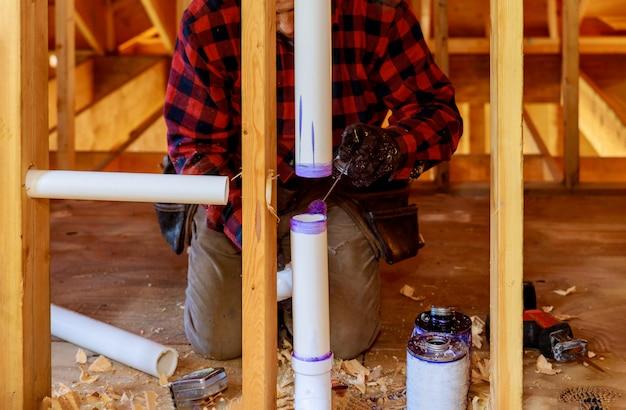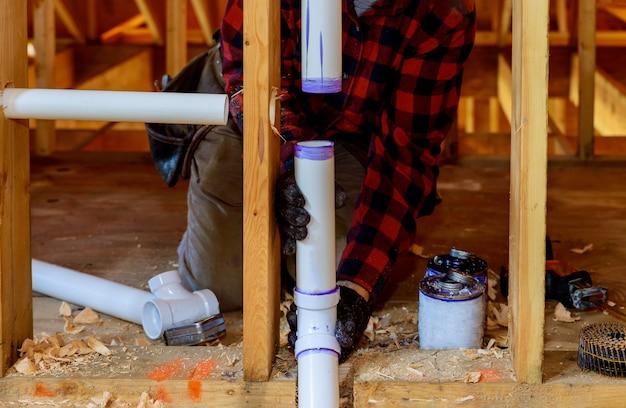PVC pipes and fittings are commonly used in plumbing and construction projects due to their durability and affordability. When working with PVC, using a primer before applying adhesive or paint is crucial for creating a strong bond and ensuring the longevity of your project. However, what can you do if you don’t have PVC primer on hand or prefer to explore alternative options? In this blog post, we will explore substitutes for PVC primer, discuss their effectiveness, and provide tips for preparing PVC for painting without using traditional primers.
Why Use PVC Primer
Before we dive into alternative options, let’s briefly address the importance of using PVC primer. PVC primer is a solvent-based cleaner and conditioner that helps remove dirt, debris, and oil from the surface of PVC pipes and fittings. It also softens the PVC, allowing the adhesive to penetrate and create a strong bond. Additionally, using primer helps ensure proper adhesion and enhances the overall reliability and longevity of your PVC project.
Stay tuned as we explore various substitutes and alternative methods to prepare PVC for painting without traditional PVC primers.
What alternatives to PVC primer can I use for my project
Understanding the need for alternatives
When it comes to working with PVC pipes, using a primer before applying glue is a common practice. However, there may be situations where you need to find an alternative to PVC primer. Whether you run out of primer in the middle of a project or you have concerns about using it, fear not! There are several alternatives available that can get the job done without compromising the quality of your project.
1. Acetone – The versatile option
If you’re looking for a reliable alternative to PVC primer, acetone can be an excellent choice. This commonly available solvent is known for its ability to dissolve PVC, making it an ideal substitute for primer. Just like PVC primer, acetone prepares the surface of the pipe for the adhesive, ensuring a strong bond. However, be cautious with acetone, as it is highly flammable and should be handled with care.
2. Rubbing alcohol – A multipurpose solution
Another alternative to PVC primer is rubbing alcohol. Found in most medicine cabinets, rubbing alcohol is not only useful for cleaning wounds but also for preparing PVC pipes. It removes dirt and grease, ensuring a proper adhesive bond. Remember to use an alcohol concentration of 90% or higher for the best results. So, the next time you need an alternative to PVC primer, head to your medicine cabinet and grab that bottle of rubbing alcohol!
3. Nail polish remover – Not just for nails
That’s right – nail polish remover can also serve as a replacement for PVC primer! Look for a nail polish remover that contains acetone, as it will effectively clean and prepare the surface of your PVC pipes. Its strong solvent properties make it a viable alternative to PVC primer. Just apply it to the surface and let it do its magic before applying the adhesive. However, ensure proper ventilation as the fumes can be quite potent!
4. Sandpaper – Good old-fashioned elbow grease
If you find yourself in a pinch without any of the above alternatives, fear not! Sometimes, all you need is a little elbow grease and some sandpaper. By gently sanding the surface of the PVC pipes, you can create a rough texture that promotes better adhesion. While it might require a bit more effort, sandpaper can work wonders if you’re in a bind and need to proceed with your project.
While PVC primer is commonly used in plumbing projects, it’s reassuring to know that there are viable alternatives available when you need them. Whether it’s acetone, rubbing alcohol, nail polish remover, or even good old sandpaper, these alternatives can help you ensure a strong bond between PVC pipes without the traditional primer. So, the next time you find yourself running out of PVC primer or hesitating to use it, remember these alternatives and get your project back on track!
FAQ: What Can I Use Instead Of PVC Primer
Welcome to our comprehensive FAQ-style guide on finding alternatives to PVC primer. We know you’re eager to get started on your PVC projects, so let’s dive right into the frequently asked questions about this topic!
Does PVC Need to Be Primed Before Painting
Yes, PVC should always be primed before painting. Priming helps the paint adhere better to the surface, ensuring a longer-lasting and more vibrant finish. It also acts as a protective layer, preventing the paint from chipping or peeling.
Is There a Substitute for PVC Primer
While PVC primer is the recommended choice, there are alternative options available. One popular substitute is a product called “PVC Cleaner.” It effectively cleans and prepares the PVC surface for painting without the need for traditional primer. Just remember to read the instructions carefully and follow the manufacturer’s recommendations.
Can Alcohol Be Used as Primer
While alcohol may be your secret ingredient for a fun Friday night, it is not a suitable substitute for PVC primer. Alcohol doesn’t provide the same adhesive properties or protective coating that primer does. So, keep the alcohol for your cocktails rather than your PVC projects!
What Can I Use to Clean PVC Pipe
To clean PVC pipe, you can use a variety of household items. Soap and water work well for general cleaning. If you need something stronger, consider using a PVC pipe cleaner specifically designed for removing dirt, grease, and debris from PVC surfaces.
Does CPVC Need Primer
Yes, just like PVC, CPVC (chlorinated polyvinyl chloride) also requires primer before painting. The priming process ensures optimal adhesion and helps protect the CPVC from damage.
Is Primer Necessary for PVC Pipe
Absolutely! Primer is an essential step before painting PVC pipe. Don’t skip it or try to find shortcuts. The few extra minutes you spend priming will save you from potential issues down the line, such as peeling or chipping paint.
Can You Glue Painted PVC Pipe
Yes, you can glue painted PVC pipe. However, it’s important to note that the glued joint will be stronger than the paint’s adhesion to the surface. So, while gluing painted PVC is possible, it’s always best to apply the glue to unpainted areas for a more secure bond.
Will Gorilla Glue Work on PVC Pipe
Gorilla Glue is an excellent adhesive but is not recommended for use on PVC pipe. It may not provide the optimal bonding strength required for PVC projects. It’s best to use a solvent-based PVC adhesive specifically designed for bonding PVC materials.
Can You Paint PVC with Regular Paint
Yes, you can paint PVC with regular paint. However, it’s crucial to choose a paint that is compatible with PVC and suitable for outdoor use. Look for paints labeled as “PVC-friendly” or “suitable for plastics” to ensure the best results.
Do You Let PVC Primer Dry Before Cement
Definitely! After applying primer to the PVC surface, you should allow it to dry completely before applying cement. Drying times may vary, so be sure to follow the manufacturer’s instructions to achieve the best adhesion.
Can You Use Rubbing Alcohol for Paint Prep
While rubbing alcohol may be handy for cleaning and disinfecting, it’s not ideal for paint prep on PVC. It lacks the adhesive properties necessary for optimal paint adhesion. Stick to using PVC cleaner or primer specifically formulated for paint preparation.
Can I Use CPVC Glue on PVC
No, CPVC glue should not be used on PVC. The two types of glue are formulated differently and adhere to their specific materials. Choose a PVC glue suitable for PVC projects to ensure a reliable and secure bond.
Can I Use Super Glue on PVC Pipe
Super glue, or cyanoacrylate adhesive, is not recommended for use on PVC pipe. PVC requires a solvent-based adhesive that can chemically bond with the material for a durable hold. Opt for the appropriate PVC glue to ensure a strong and lasting joint.
Can I Use Rubbing Alcohol Instead of PVC Primer
No, rubbing alcohol is not a suitable substitute for PVC primer. While alcohol may have some cleaning properties, it lacks the necessary components for priming PVC effectively. Stick to using a reliable PVC primer specifically designed for the job.
Can I Paint Over PVC
Absolutely! Painting PVC is a great way to add color and creativity to your projects. Just remember to clean the surface thoroughly, prime it for optimal adhesion, and choose a paint suitable for use on plastics. With proper preparation, your painted PVC will be ready to make a colorful statement!
How Do You Prepare PVC for Painting
Preparing PVC for painting is relatively simple. Follow these steps for best results:
- Clean the surface: Use soap and water or a PVC pipe cleaner to remove dirt, grease, and debris.
- Sand the surface: Lightly sand the PVC to create texture that helps the primer and paint adhere better.
- Apply primer: Using a PVC primer, cover the entire surface evenly. Allow it to dry completely before moving on.
- Paint the PVC: Once the primer is dry, apply your chosen paint using smooth and even strokes. Allow it to dry fully between coats.
Remember, proper preparation is key to achieving a beautiful and long-lasting paint job on PVC!
Can You Use Rubber Cement on PVC
No, rubber cement is not suitable for PVC. Rubber cement is typically used for temporary repairs and has different adhesive properties that may not properly bond with PVC. Choose a PVC-specific adhesive for your PVC projects to ensure a secure and lasting hold.
That concludes our comprehensive FAQ guide on alternatives to PVC primer. We hope you found the information helpful and entertaining. Now go forth and conquer your PVC projects with confidence and a splash of color!

